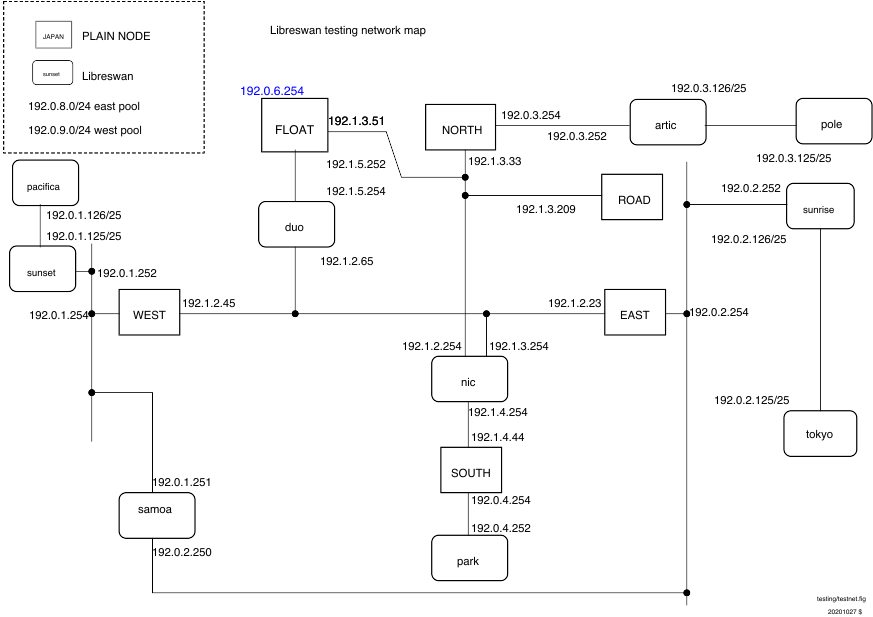Test Suite: Difference between revisions
Jump to navigation
Jump to search
(add out-of-date diagram) |
(more test details) |
||
| Line 35: | Line 35: | ||
|} | |} | ||
== | == How tests work == | ||
All the test cases involving VMs are located in the libreswan directory under <tt>testing/pluto/</tt>. The most basic test case is called basic-pluto-01. Each test case consists of a few files: | |||
* description.txt to explain what this test case actually tests | |||
* ipsec.conf files - for host west is called west.conf. This can also include configuration files for strongswan or racoon2 for interop testig | |||
* ipsec.secret files - if non-default configurations are used. also uses the host syntax, eg west.secrets, east.secrets. | |||
* An init.sh file for each VM that needs to start (eg westinit.sh, eastinit.sh, etc) | |||
* One run.sh file for the host that is the initiator (eg westrun.sh) | |||
* Known good (sanitized) output for each VM (eg west.console.txt, east.console.txt) | |||
* testparams.sh if there are any non-default test parameters | |||
Once the test run has completed, you will see an OUTPUT/ directory in the test case directory: | |||
<pre> | |||
$ ls OUTPUT/ | |||
east.console.diff east.console.verbose.txt RESULT west.console.txt west.pluto.log | |||
east.console.txt east.pluto.log swan12.pcap west.console.diff west.console.verbose.txt | |||
</pre> | |||
* RESULT is a text file (whose format is sure to change in the next few months) stating whether the test succeeded or failed. | |||
* The diff files show the differences between this testrun and the last known good output. | |||
* Each VM's serial (sanitized) console log (eg west.console.txt) | |||
* Each VM's unsanitized verbose console output (eg west.console.verbose.txt) | |||
* A network capture from the bridge device (eg swan12.pcap) | |||
* Each VM's pluto log, created with plutodebug=all (eg west.pluto.log) | |||
* Any core dumps generated if a pluto daemon crashed | |||
; testing/baseconfigs/ | ; testing/baseconfigs/ | ||
: configuration files installed on guest machines | : configuration files installed on guest machines | ||
; testing/guestbin/ | ; testing/guestbin/ | ||
: shell scripts used by tests, and run on the guest | : shell scripts used by tests, and run on the guest | ||
; testing/linux-system-roles.vpn/ | ; testing/linux-system-roles.vpn/ | ||
: ??? | : ??? | ||
| Line 61: | Line 81: | ||
; testing/utils/ | ; testing/utils/ | ||
: test drivers and other host tools | : test drivers and other host tools | ||
; testing/x509/ | ; testing/x509/ | ||
: certificates, scripts are run on a guest | : certificates, scripts are run on a guest | ||
Revision as of 20:27, 5 October 2021
Running tests
The libreswan tests, in testing/pluto, can be run using several different mechanisms:
| Framework | Speed | Host | Guest | Modifies / | Notes |
|---|---|---|---|---|---|
| Namespaces | fast | linux | linux | yes | results are host dependent (for instance the host's kernel version) requires all dependencies, including libreswan, to be installed on / |
| KVM | slower | generic? | Fedora, OpenBSD | no | in theory it can be run on any system supporting libvirt/KVM (but only Linux has ever been used) |
| Docker | linux | Linux centric using host kernel. Ideal for build tests. Can build using various Linux Distributions : CentOS 6, 7, 8, Fedora 28 - rawhide, Debian, Ubuntu. Also for run tests using systemd. |
How tests work
All the test cases involving VMs are located in the libreswan directory under testing/pluto/. The most basic test case is called basic-pluto-01. Each test case consists of a few files:
- description.txt to explain what this test case actually tests
- ipsec.conf files - for host west is called west.conf. This can also include configuration files for strongswan or racoon2 for interop testig
- ipsec.secret files - if non-default configurations are used. also uses the host syntax, eg west.secrets, east.secrets.
- An init.sh file for each VM that needs to start (eg westinit.sh, eastinit.sh, etc)
- One run.sh file for the host that is the initiator (eg westrun.sh)
- Known good (sanitized) output for each VM (eg west.console.txt, east.console.txt)
- testparams.sh if there are any non-default test parameters
Once the test run has completed, you will see an OUTPUT/ directory in the test case directory:
$ ls OUTPUT/ east.console.diff east.console.verbose.txt RESULT west.console.txt west.pluto.log east.console.txt east.pluto.log swan12.pcap west.console.diff west.console.verbose.txt
- RESULT is a text file (whose format is sure to change in the next few months) stating whether the test succeeded or failed.
- The diff files show the differences between this testrun and the last known good output.
- Each VM's serial (sanitized) console log (eg west.console.txt)
- Each VM's unsanitized verbose console output (eg west.console.verbose.txt)
- A network capture from the bridge device (eg swan12.pcap)
- Each VM's pluto log, created with plutodebug=all (eg west.pluto.log)
- Any core dumps generated if a pluto daemon crashed
- testing/baseconfigs/
- configuration files installed on guest machines
- testing/guestbin/
- shell scripts used by tests, and run on the guest
- testing/linux-system-roles.vpn/
- ???
- testing/packaging/
- ???
- testing/pluto/TESTLIST
- list of tests, and their expected outcome
- testing/pluto/*/
- individual test directories
- testing/programs/
- executables used by tests, and run on the guest
- testing/sanitizers/
- filters for cleaning up the test output
- testing/utils/
- test drivers and other host tools
- testing/x509/
- certificates, scripts are run on a guest
